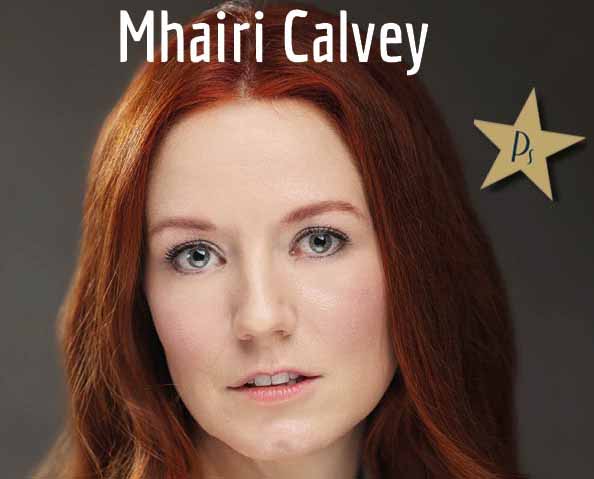
By Claire Bueno
I’ve known Mhairi Calvey for some years and so happy to call her a friend. So when the opportunity arose to interview her for her latest film Fear the Invisible Man I jumped at the chance to support her, she truly is a delightful, sweet and talented human being.
Mhairi incredibly debuted in film as a child appearing in Mel Gibson's Braveheart playing the role of Young Murron, she has learned from the best! Playing the lead as Adeline in gothic horror Fear the Invisible Man, she captivates audiences in a story full of nuance and subtext. Inspired by H. G. Wells’ The Invisible Man, the film is a fine example of what can be achieved with independent film making. This has been a labour of love as Mhairi and discuss.
This feels like a really ambitious project to pull off, you must be super proud of the finished film.
It was really challenging, and we went through a lot to get it made. I was cast early on, via the producers who I was shooting a film with over in Germany, so I really felt like I went through the rollercoaster of the journey with the whole production team. It was interesting as an actress to see the stages of a film getting financed. The project was originally going to be funded via the SEIS Scheme, but the government closed the scheme down causing delays. Then the plan was to shoot in 2020, of course that's when covid hit, finally we filmed in 2021, covid regulations still applied on set at the time so it was a big adjustment but felt great to be back on set and I am so grateful I had a job straight after the pandemic. I am really proud of what we all as a team pulled together, shooting any production is hard but an independent film which is a period drama with heavy effects and in only a month was a big undertaking.
You’re playing the part of Adeline; I saw her as spirited and full of verve but tell us more about her?
Adeline was a dream character to play, she was before her time. I love that her soul is good and although she is going through her own hardships, she wants to help those less fortunate especially people who are mentally unwell or those in poverty. She wants to make change and be heard. She is an academic, forward thinking and although she experiences rejection repeatedly, she never quits her pursuits. She's become widowed in the last few years and learnt to stand up for herself and embrace independence. The character has so many layers and so much subtext to play that I was in the fortunate position of being able to make many different performance choices.
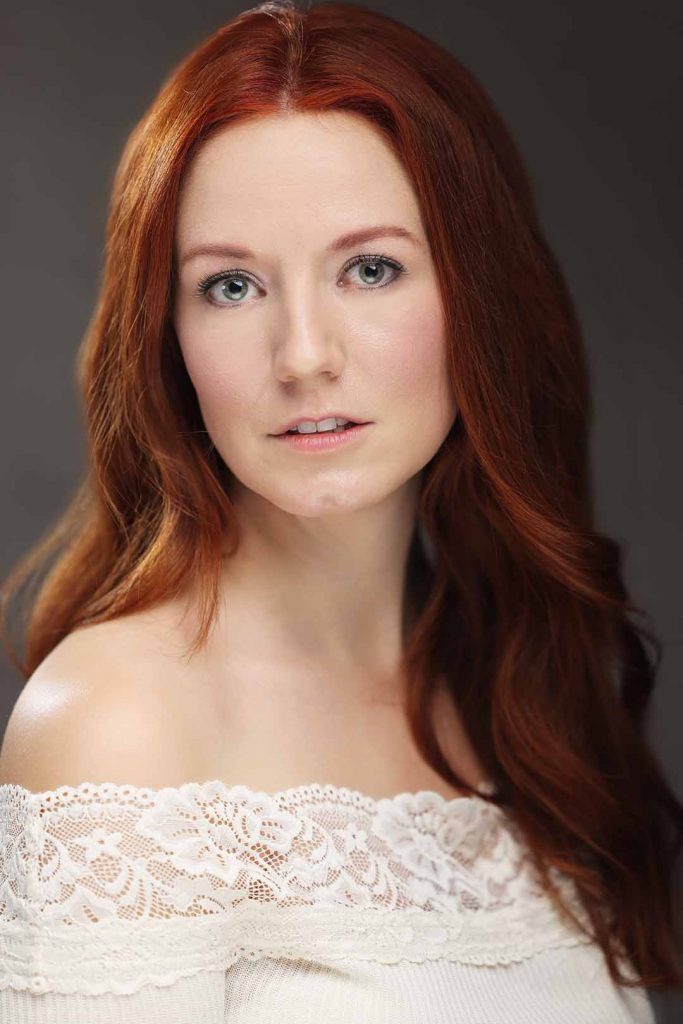
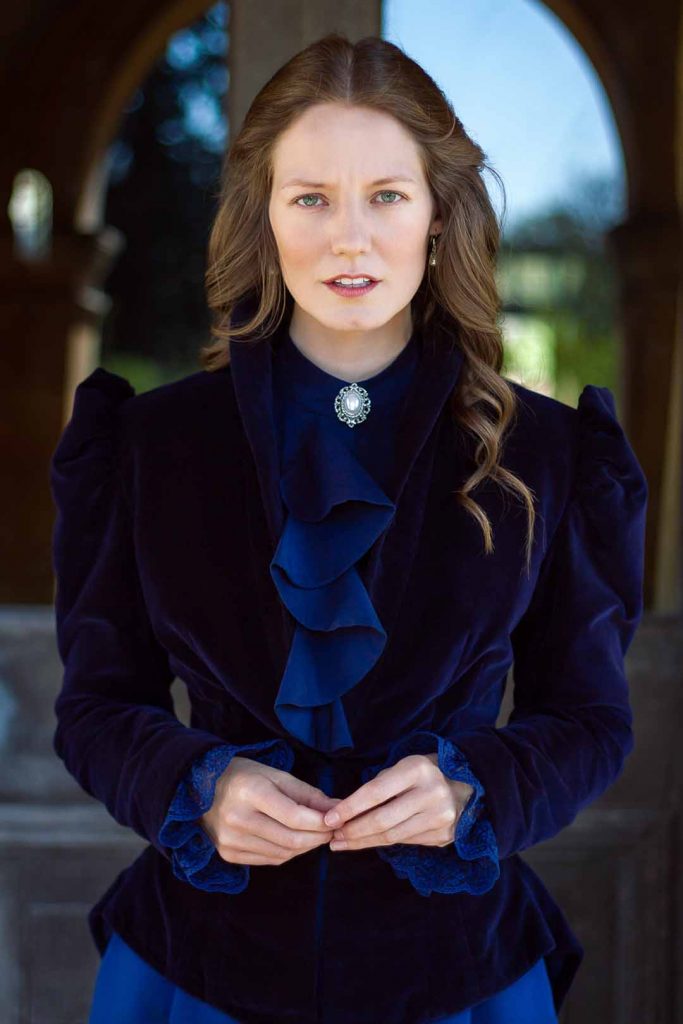
We see your character is very conflicted, she is having to be practical because of her financial situation, but she is also ethically conflicted, this must have been such a rewarding part to play?
This was the really interesting bit to play, I mean first of all no one would ever believe her so she can't speak the truth, also there are times where she was brought into a crime without even knowing it until it's too late but she's unable to explain or prove that it is in fact the Invisible Man causing these things to take place. It actually touches on cohesive abuse which I found fascinating to play and shows how a good person can go down for the bad actions of others just by being caught in the crossfire. She has to hold a lot of secrets, navigate herself out of the situation carefully and be extremely careful about what she says and to who.
The story is of the invisible man, but for me this also serves as a metaphor for your character within in Victorian society and is indeed representational of women of that era that have a lot to offer but are not being listened to and invisible to the men that can help them fulfil their full potential. Is that how you saw it?
Absolutely! That's actually what drew me to the script. Like you said, women back then were rarely listened to or taken seriously. They had no voice and were discouraged from using their voices. It was an extremely suppressed period of time in society. I think people today will relate to this part of the character and the frustrations that come with it. I've actually had conversations with my friends regarding this and sadly it still goes on today, being a young women in business is hard to be listened to or for your ideas to be taken on board so hopefully the film shines a little light on those points.
The story is based on The Invisible Man by H. G. Wells, did you read the book as part of your research? Or did you prefer to be unencumbered and just rely on the adaptation within the script?
I love research, it's one of my favourite aspects of the job, so I watched the 1933 version of the film and read the book. I also watched the 2020 version of the film with Elisabeth Moss because most people are going to compare the films with each other. It was important to me to make different performance choices in our version. Elizabeth Moss did an incredible job of showing fear and I love her as an actress. She's someone I really look up to so it was scary to take on a similar role but an incredible opportunity. Paul Dudbridge (the Director) and I spoke about how once my character Adeline finds out that it's Griffin who is the Invisible Man her fear fades, they were friends and have a past as well as a potentially romantic backstory, so I wanted to show her scientific interest to begin with then take her emotional journey from there.
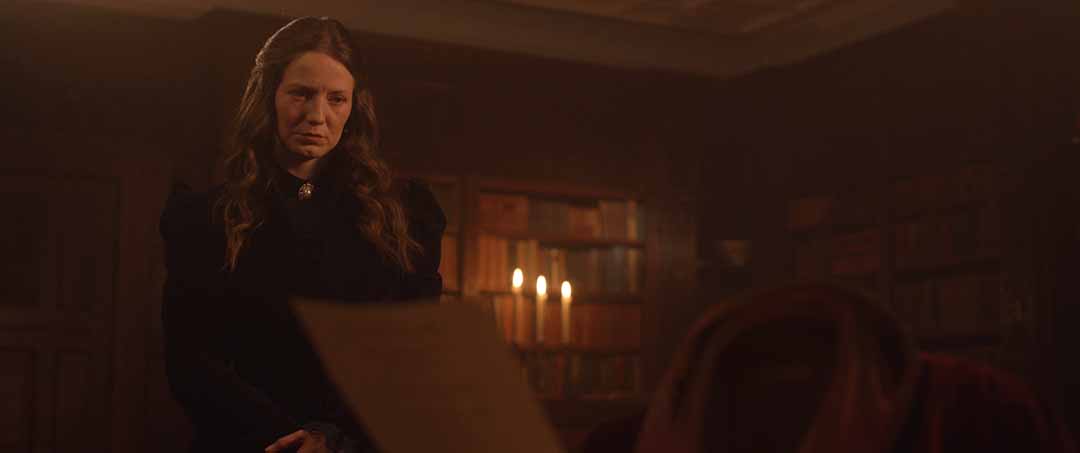
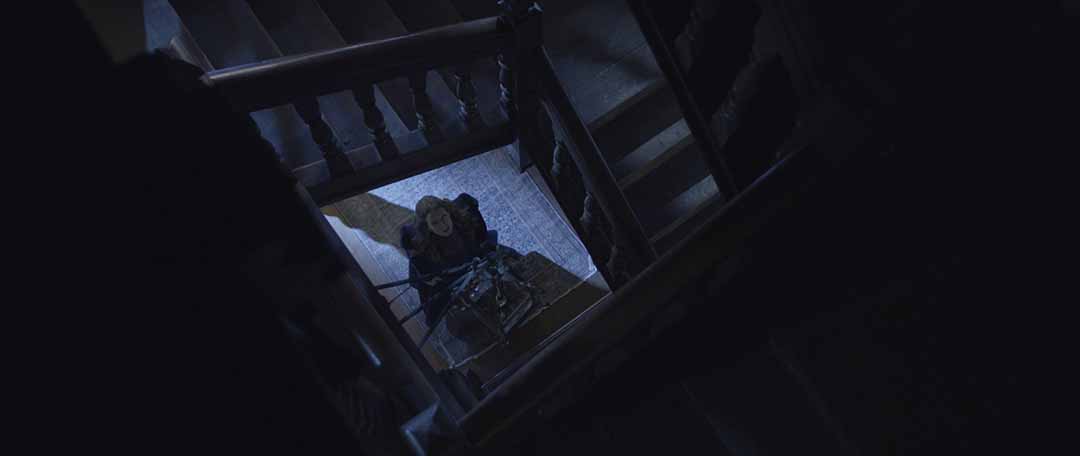
“Being a young women in business is hard to be listened to, or for your ideas to be taken on board, so hopefully the film shines a little light on those points.”
This maybe more of a question for the writers but there’s a real gothic horror feel for Fear the Invisible Man, how challenging was it to strike the balance with delivering a classic suspenseful horror juxtapose the gore type horror that 21st century audiences may expect?
We used the 2010 'The Wolfman' movie as a good frame of reference. Rather than using blood it was more of a feeling and tone we wanted to convey, and it was a conscious decision to make the film a little bit more family friendly. Another benchmark was Tim Burton, Paul (the Director) and Alex Metcalf (the DOP) were inspired by the gothic visuals he has in his films. We were blessed with a wonderful DP in Alex who is fantastic at using lighting to create a really moody atmosphere and Paul started out as a cinematographer before becoming a director. Between them the lighting and camera work becomes almost like the Invisible Man character in the film. The cinematography really makes a huge difference with films like this. We were also blessed with having a great editor in Simon Pearce, the way he cut the film really helped to sell the suspense.
Costume! Those corsets cannot be easy to wear! But once you put on the costume does that help better inform your connection to the character? How does it help elevate your performance?
The costume was co-designed and tailored by Poppaea Bicknell who worked closely with Robyn Manton our head of costume on the film, it was a dream to wear and really helps you transform into role. I am a huge fan of costume dramas and wearing a corset really helped me embody what Adeline would have felt emotionally. The clothes women wore back then really reflected how they were treated in society and how they were constricted mentally as well as physically. The costume really leant itself to the script, I was lucky to also be involved in the costume discussions and lend some thoughts. One key element is that Adeline is financially struggling so we didn't want to have her appear in loads of outfits, it's said in the story that she is selling her belongings so she would only be down to the essentials. Poppaea chose beautiful fabrics to reflect the light and the dark blue gave a great gothic vibe. To show how Adeline's story progresses Robyn chose for the costume to start changing colour. The more that Adeline is in danger the more red appears on the costume. The action scenes towards the end were my biggest challenge, the corset Poppaea made was a real corset, so the scenes where I am running and falling were really fun to shoot, I had to really think about how I was going to breath, there were also loads of layers, so it was heavy. I got a good work out each day. Actually, one of the hardest things was going up and down stairs, you could easily become breathless, and I had a few scenes in the film where I am either running or doing heavy dialogue scenes while walking upstairs. I had to learn a different way of moving. The shoes were genuine Victorian heeled boots and laced all the way up, by the end of each day I was very blistered, but it all adds to the experience and really helps you become a women of the Victorian era. I loved that element of stepping back in time.
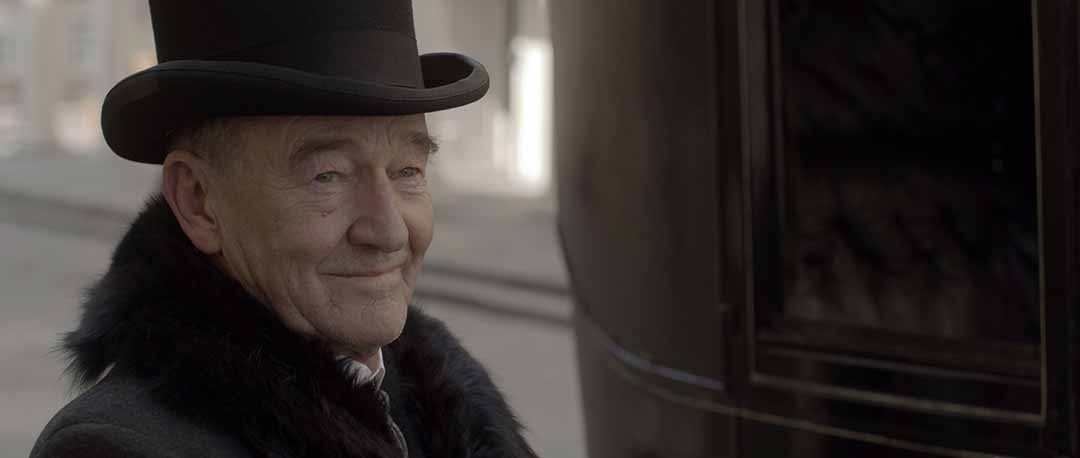
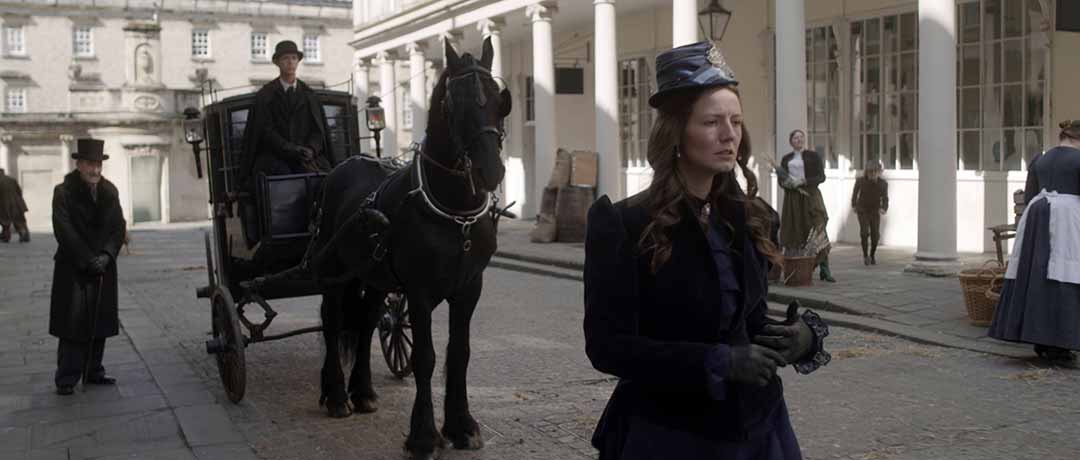
You share scenes with the legendary David Hayman, how important is it for independent films to have a marquee name attached to projects?
Working with David was such a privilege, obviously I had seen a great deal of his work before being on set with him so I learnt a lot by watching him work. One thing he taught me was that it's okay to ask the crew to accommodate certain things in order to help you as an actor deliver a truthful performance. I think it can help independent films if they get a named actor because it helps to get finance in place or seal a distribution deal but I think as long as a film is made well and the script is solid it has a great chance of being a success, I think marketing is almost more important. Plenty of films with complete unknowns can turn over millions simply by creating a new idea, look at 'Paranormal Activity' as a great example. I think if you can get a really big star to cameo then that makes a huge difference for sure because they have international appeal. In our case David actually came on after we got the funding and had already started filming so it was just more about the right actor for the job, we were lucky to get him and we have some nice moments together with lots of fun subtext to play.
What has been the most rewarding part of starring in Fear the Invisible Man?
There were many, when I was a child watching Jennifer Ehle in the BBC adaptation of 'Pride and Prejudice' was the moment I realised I wanted to be an actor. I love how natural she was in period dramas, she didn't play the period, she just happened to be a person living in that period which is something that stuck with me as a performer. I have been hooked on period dramas since then. I had always dream't of one day walking down a period drama street with horses, carriages and in costume. To have it come true was incredible. I had to really fight for the part at times, although I was cast early on I had never done something like this before so needed to prove myself. It was a long journey and gave me such an insight into what goes on to get a film financed and on it's feet. There were times we would all worry it might not get made so the fact that we've done it and it's about to be released is the biggest reward for me. Everyone involved genuinely put blood, sweat and tears into it and it's great to see all that hard work combined.
Mhairi Calvey
stars in
Fear the Invisible Man
Released in the US & UK 13th June
Available on DVD & VOD
Credits
Photographer: Lumosia | Production Stills: Poppaea Bicknell
Fear the Invisible Man - Trailer
Follow on Social Media
| #feartheinvisibleman | Twitter: @FearInvisible |
Claire Bueno
Claire Bueno is a film journalist, presenter and interviewer, having moderated BAFTA, Royal Television Society (RTS), Women in Film and Television (WFTV), and Apple Store Q&As and hosted Comic Con panel talks. Claire is the founder of Premiere Scene Magazine and has had the privilege of interviewing esteemed artists including Tom Cruise, George Clooney, Brad Pitt, Sir Anthony Hopkins, Sigourney Weaver, Emily Blunt, Samuel L Jackson, James Cameron and Andy Serkis.
As a media coach Claire works with leading personal publicists, HBO, Netflix, Sky, ITV, Penguin Random House, the BFI, DDA, MacMillan and Premier, offering practical coaching sessions and safe environment for talent to perfect their interview technique before facing the press. She has extensive experience working with emerging and seasoned professionals and where English is not their first language.
Additionally, Claire is the producer of the critically acclaimed feature documentary CLEANIN’ UP THE TOWN: Remembering Ghostbusters and the upcoming TOO HOT TO HANDLE: Remembering Ghostbusters II.
